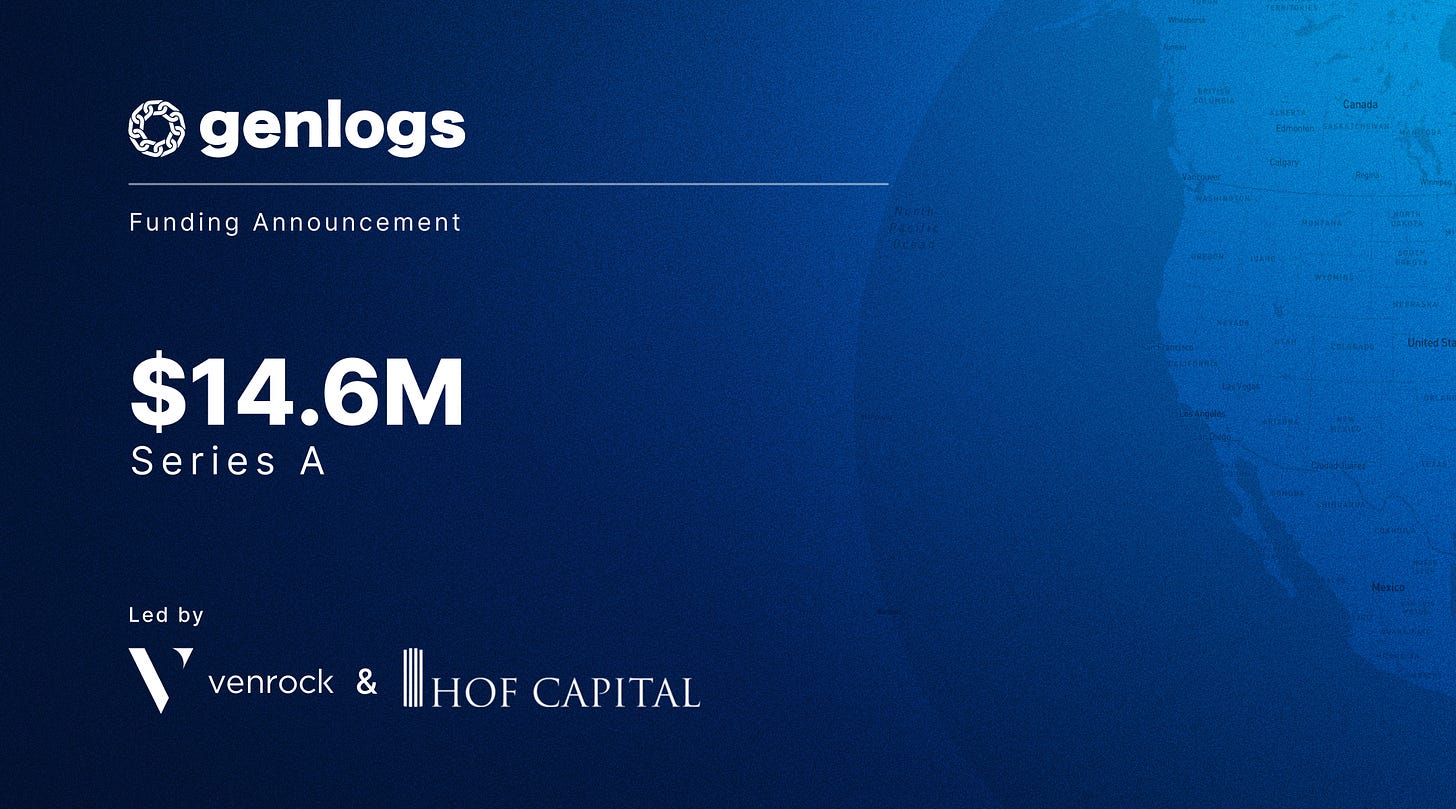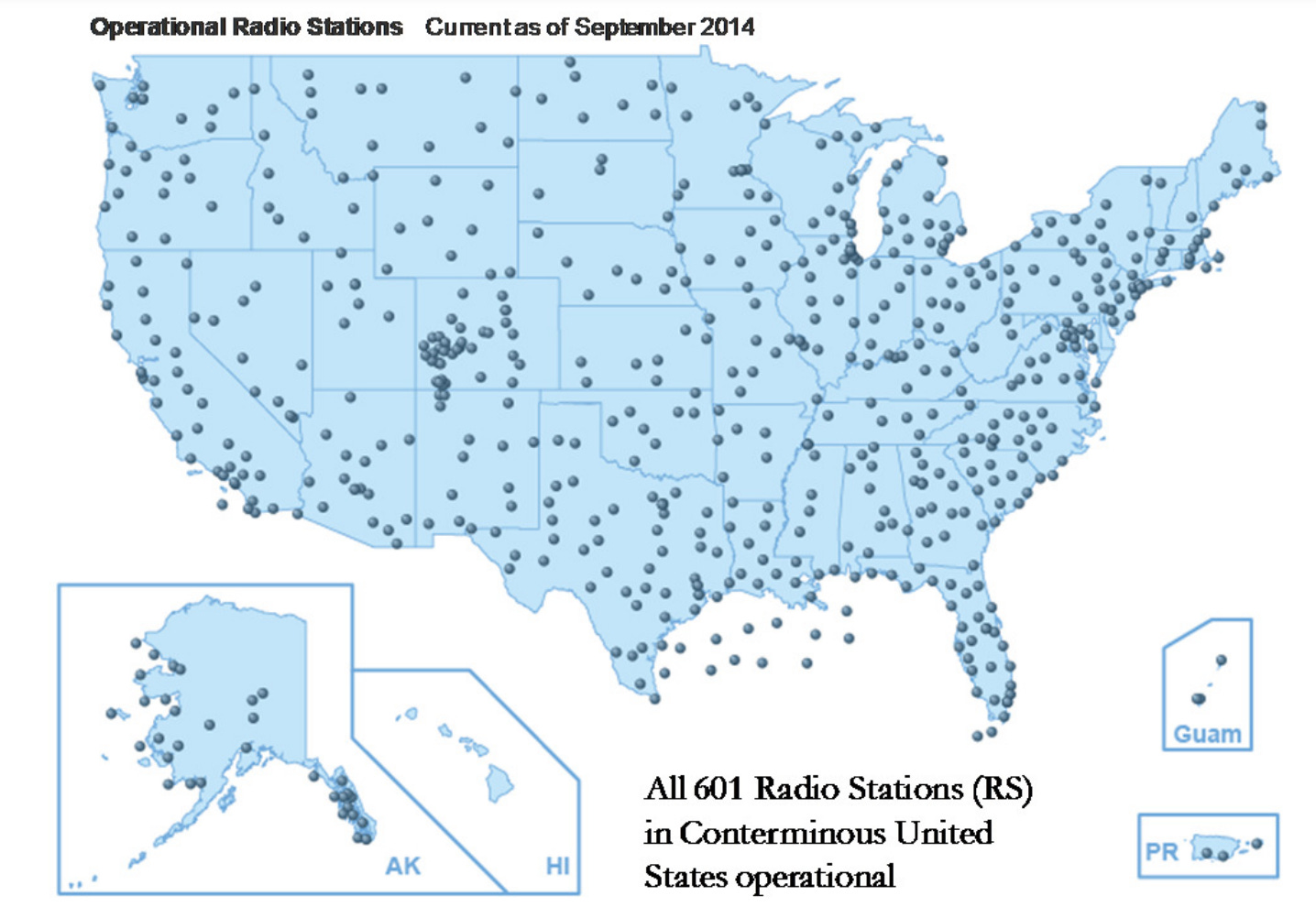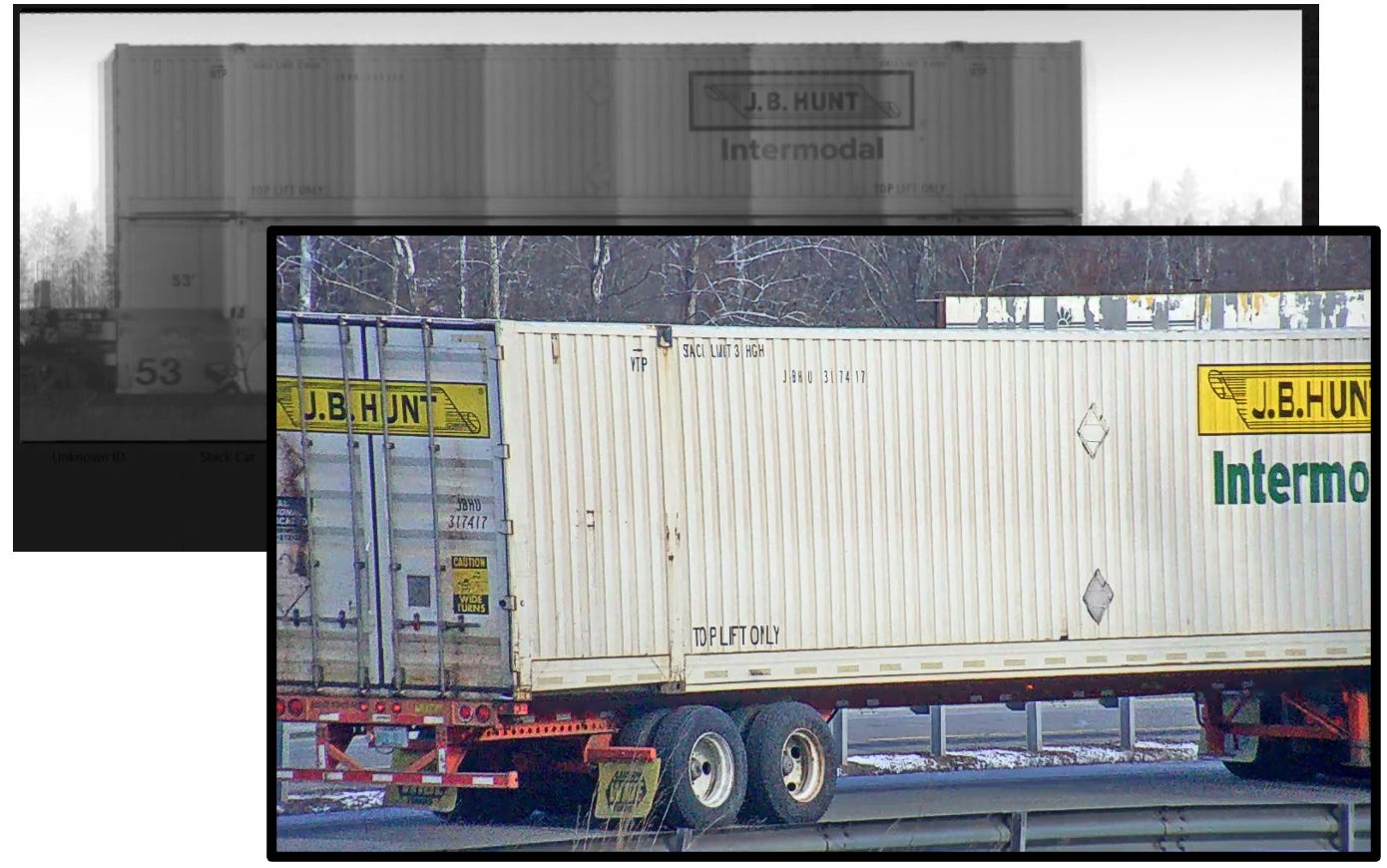Our Series A Funding & Doing Hard Things
Despite AI promising to make our lives easier, there is still immense value in doing hard things...
Today, GenLogs announced its $14.6M Series A funding round led by Venrock and HOF Capital to fuel the freight industry's return after a few years of recession. While the press release is rather short and succinct, we wanted to take a bit more time to explain why we decided to raise the round now, the vision we plan to accomplish with the funding, and why we remain committed to doing hard things.
We often get the question -- is GenLogs a hardware company? A software company? Or an AI company? The answer is: yes. We are all of those things, and that is what makes GenLogs unique among startups such a formidable company in the freight space. We made the difficult decision early on that we were going to build and deploy hardware across the United States to collect proprietary data on trucks that never existed before. Each day there are nearly 4 million trucks that criss-cross our nation's roads delivering over $7 trillion of annual goods, and while most of them have electronic logging devices (ELDs) recording their routes, that data is shared on a very limited basis and otherwise remains trapped. That data contains extraordinary value to both unlocking efficiency and can also be used as a shield to protect against fraudulent actors that is plaguing the industry. So we decided to go collect all the data ourselves without needing any driver or fleet manager to actively share it.
Building a nationwide commercial network is hard. Few have successfully done it. It took Verizon decades to assemble their nationwide network of cell towers, but even that was accomplished mostly by acquisitions and the merging of Bell Atlantic with GTE. To track flights over the United States, there are 660 ADS-B ground stations deployed coast-to-coast that monitor every plane's position in the sky -- but even those are installed and administered by the FAA. Flock Safety is probably the best proxy for the work GenLogs is undertaking. Flock has deployed thousands of automatic license plate recognition (ALPR) cameras in over 5,000 communities and businesses nationwide. Data collected across this network is available to law enforcement via their FlockOS platform, but due to privacy concerns and their terms of service, this data is not available commercially (and rightfully so). So the gap still remained for commercially-available ubiquitous data on trucks. But building a nationwide commercial network is hard.
At GenLogs, we do hard things.
It is important to keep in mind that 18 months ago, there was no nationwide network of truck-tracking sensors. There was only the one test sensor we had installed along I-95 near Richmond, Virginia. While the 'easy' solution would have been to simply deploy an off-the-shelf ALPR camera, this would not have been sufficient for our ambition. Simply collecting on truck license plates would have not unlocked real value. This is why ELD data alone is insufficient, as it does not tell you what type of equipment a truck is hauling. To drive the real value we envisioned, we needed multiple cameras to collect datapoints from the front, side, and rear of the truck -- and then we needed to stitch all that data together as one unique truck record. Nothing off-the-shelf would cut it, so we designed and built our own three-headed camera system that allowed us to run our native AI at the edge to capture three views of the truck with enough fidelity to pull a number as small as your pinky flying by at 75 miles per hour.
At GenLogs, we do hard things.
Once we had figured out the sensor, it was time to start building the network -- but to do so, we needed capital. Even back in 2023, the word 'hardware' was still a dirty word among venture capitals. Hardware is hard. Most avoided it like the plague. Not only were we assembling hardware, but we had to deploy a full network of the hardware for our grand plan to work -- so now we were layering in execution risk on top. Our vision was just crazy enough for VCs to take the meeting, but also crazy enough that 100 said 'no.' Raising capital is hard, but try being three first-time founders with no freight experience wanting to build a nationwide network of hardware.
At GenLogs, we do hard things.
We kept deploying sensors with our personal savings and eventually a bold contingent of investors emerged to help close our Seed round in December 2023. During our first Board meeting of 2024, we landed on an ambitious timeline of releasing our product to the market in July 2024. At that time it was still just the three founders. We hadn't yet set up reliable manufacturing. We hadn't figured out how to scale our sensor network. We hadn't hired, let alone even found, the talented teammates that would actually do the day-to-day building. We hadn't collected enough data to curate our own computer vision models. We didn't even know enough about freight to know exactly what we should build. Delivering a product within seven months seemed impossible.
At GenLogs, we do hard things.
The thing about doing hard things over and over is that it develops a muscle built from grit and resilience. It develops a belief that you can actually do what others feel is impossible. Doing hard things is what split the atom, put a man on the moon, and why we will soon walk on Mars. So at GenLogs, we committed to hiring hungry, humble, and smart teammates who embraced doing hard things every day. One sensor led to two sensors, then a dozen suddenly surpassed a hundred. Soon we had hundreds of cameras spanning California to New York, and Minnesota to Texas. And the data started flowing, at first just a stream but soon it transformed into a mighty river.
Since November 2024, FMCSA has inspected 136,836 different carriers. During that same period, GenLogs has observed more than 260,000 different carriers via our sensors -- nearly twice as many as FMCSA, including 13,000 carriers that have never had an FMCSA inspection. We collected over 500,000,000 unique truck detections, whereas FMCSA has only done 367,920 individual truck inspections. GenLogs already has over 100x the amount of data on trucks compared to FMCSA. We now have the largest repository of truck images on the planet, and we are using this supreme data advantage to build new AI models that enable our customers to find the proverbial needle in a haystack.
The data advantage has clearly resonated with customers. We launched our product in July 2024 -- exactly on schedule -- and saw a 100% pilot conversion rate among our initial ten customers. Each of them saw ROI in short order and, more importantly, they spread the good word to friends in the industry. Our pipeline exploded. Dozens more customers joined our waitlist and ARR bookings went from $0 to nearly $10M in a matter of months. Our headcount has gone from the 3 to 43 teammates over the last year with each member committed to doing the impossible every day.
It was against this backdrop that preliminary Series A discussions began to take shape. We hadn't planned to raise a round until late Q1 2025, but even as we were heads down building, we started to get preemptive offers. A year ago we had to knock on over 100 investor doors to raise a modest Seed round, and now those same investors were trying to beat down our door. What had changed?
What had changed was the underlying thesis on AI. Around the time that GenLogs was founded, the advent of LLMs had enabled the early Agentic AI startups to form and the hype was in full-swing. VC dollars began to flow and valuations started to spike. Companies doing hard things were overlooked -- reskinning ChatGPT seemed like such an easy arbitrage. But easy is no moat. Suddenly, Agentic AI companies were popping up everywhere. Dozens of the same pitch decks hitting investor inboxes each week. Smart VCs realized that it was only a matter of time before AI would become commoditized. Some wondered if a breakthrough, like DeepSeek, may be on the horizon. Investors could still make overwhelming returns by investing in AI -- but the search was on to find AI companies that had what OpenAI, Anthropic, or DeepSeek did not: proprietary data.
How do you collect proprietary data? You use sensors. Ideally your own network of sensors that you painstakingly developed and deployed at an overwhelming scale. Ideally a network of sensors that have to be so precisely placed that there are finite locations that could facilitate the data collection. Ideally a network that has reached enough scale already to collect enough data to build, deploy, and inference AI models across a billion historical datapoints.
At GenLogs, we do hard things.
And so, as we opened ourselves up to potential Series A investors, we did so with an eye toward finding like-minded individuals that also embraced hard things. Instead of making a quick buck, we wanted to find those that were committed to doing what was hard in order to change the world.
We found that in Venrock, with investor Morgan Hitzig having done the hardest things. She served in NYPD's Counterterrorism Bureau and as a US Navy Reserve Officer with tours in the Middle East and Asia. When we first met Morgan and showed her our platform, it immediately clicked for her. She had spent her entire career conducting all-source analysis from disparate data sources and knew the power of intelligence. Thanks to her time building Dataminr, we spoke the same language and had a common vision for GenLogs' future.
We found that in HOF Capital, with general partner Hisham Elhaddad having built a multi-billion dollar AUM firm with big bets in companies doing the hardest things, like Varda and SpaceX. He understood the power of intelligence through HOF's investment in Chainalysis and the power of big data via Databricks. Their entire partnership hopped on our initial call early on a Saturday morning when most other investors would be relaxing at the pickle ball club. Like Venrock, HOF Capital moved forward with speed and high conviction.
Both investors saw the value of doing hard things.
And at GenLogs, we do hard things.
This past week, we had our first Board meeting with HOF Capital and Venrock joining Steel Atlas (who led our Seed round) and AutoTech Ventures (who led our Seed Extension) at the same table. The meeting took place in NYC high atop One World Trade Center where over twenty years ago an attack took place that proved why doing hard things to collect critical intelligence was absolutely necessary. It was this attack that propelled the three GenLogs co-founders to doing hard things across the globe to keep America safe and secure. Now at GenLogs, we are building unbreakable supply chains in order to make our world safer and stronger.
So what next? What will we be doing with over $14M of fresh capital?
We will continue to do hard things, of course. Over the next year, we will spend millions of dollars to quadruple the size of our sensor network and expand coverage into Mexico and Canada. We will also migrate from the middle mile to facilitate first- and last-mile data collection. Soon we will announce that our sensors have been deployed at a major US port -- the first of many to follow. This last week we took data from containers on rail cars near the Port of Long Beach in California and were able to track those containers onto drayage trucks in Pennsylvania -- proving that GenLogs can (and will) expand our intermodal insights in short order.
We also have plans to expand our customer base using the same underlying data. This past month, we opened our data up to the commercial auto insurance industry, and also placed our platform in the hands of public servants tasked with combatting the trafficking of fentanyl, weapons, and humans. We are witnessing the power of network effects as our nationwide network of truck-tracking sensors has enticed public entities to contribute their own data or infrastructure to our network. This past month we placed the first GenLogs sensors on a state government's roadside infrastructure and we expect many more to follow suit.
We will continue to listen to our customers’ hardest problems and dig deep to provide solutions that many once felt were impossible. We will unlock the trapped value in legacy data systems by fusing it with our own proprietary data in order to deliver insights that translate to tangible ROI for those in the supply chain. Most importantly, we will accomplish the impossible by using the capital to hire hungry, humble, and smart teammates who all share one common quality: they want to do hard things.
Because at GenLogs, we do hard things.







